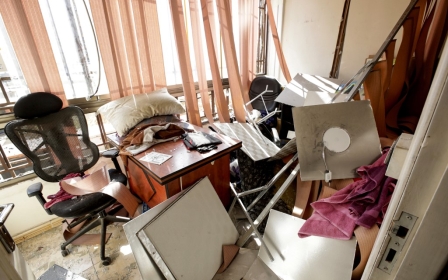Hezbollah and Israel exchange fire on Lebanese border after days of tension

Tensions continued to escalate on Sunday after Israel and Hezbollah exchanged fire on the Lebanese border for the first time in years.
Israel pummelled areas of South Lebanon with hundreds of artillery shells on Sunday in response to a Hezbollah attack, sparking fears of a potential escalation.
A Hezbollah rocket attack on northern Israel hit a military vehicle on Sunday, with Israel saying it had suffered no casualties from the raid.
The Iranian backed group said it launched its attack after reported Israeli drone incursions and cross border fire.
Hezbollah claimed in a statement it had "destroyed a military vehicle on the road to the Avivim barracks [in northern Israel], killing and wounding those inside".
Stay informed with MEE's newsletters
Sign up to get the latest alerts, insights and analysis, starting with Turkey Unpacked
Israel's military confirmed anti-tank rockets had been fired at its positions but said it had suffered no casualties.
"A number of anti-tank missiles were fired from Lebanon towards an [Israeli military] base and military vehicles," an Israeli army statement said. "A number of hits have been confirmed. [Israel's military] is responding with fire towards the sources of fire and targets in southern Lebanon."
The UN called for restraint and France said it had made "multiple contacts" to avert an escalation.
The United States voiced concern on Sunday, slamming the "destabilizing role" of Iranian proxies in the Middle East. "We are aware of these reports and are concerned about the escalating tensions along the border," said a State Department official.
"The United States fully supports Israel's right to self defense," the official said, warning: "Hezbollah should refrain from hostile actions which threaten Lebanon's security, stability and sovereignty."
The Lebanese army said 40 rockets had been fired into its country's south from Israel.
"The Israeli occupation forces targeted areas outside Maroun al-Ras, Aitaroun and Yaroun with more than 40 cluster and incendiary rockets," it said in a statement.
Israel said shelters were being opened four kilometres south of the border with Lebanon.
The rocket attack came after a series of cross-border Israeli attacks reported in recent hours, including drones and artillery fire that are accused of torching Lebanese farmland.
Sunday's escalation comes at a time of soaring tensions between the neighbours, following an Israeli drone attack last week in Beirut's southern suburbs that Hezbollah vowed to respond to.
Earlier, the Lebanese army and local media said Israeli incursions had created fires in Lebanon's south.
"An Israeli enemy drone breached the national airspace over Bastra Farm at 11:15 am on Sunday, and threw incendiary materials at the oak trees in the area, thus causing a fire to break out," a Lebanese army statement said.
"The breach is being followed up in coordination with the UNIFIL peacekeeping forces in the south," it added, referring to the UN peacekeeping force along the Lebanese-Israeli border.
Earlier in the day, Hezbollah-affiliated Al Manar TV said that Israeli artillery fire had struck southern Lebanon, with other reports claiming Israeli flares had reportedly hit the Shebaa Farms, occupied by Israel but claimed by Lebanon and Syria.
The reported attacks come a day after Hezbollah leader Hassan Nasrallah vowed retaliation for an Israeli drone attack last week in Beirut's southern suburbs.
"Our response for last week's events will be [launched from] within Lebanon against Israeli targets. We usually strike in the area of the Shebaa Farms," Nasrallah said on Saturday, adding that the group would not limit its response to one target.
In response, the Israeli military increased the number of troops on the northern border with Lebanon over the weekend, in preparation for a possible attack. Aerial defence was also deployed to thwart unmanned aerial vehicles, while the Israeli Navy was put on guard.
Dummy soldiers have also reportedly been placed by Israel along the border as it prepares for Hezbollah retaliation.
By Saturday, Israelis reported seeing troops, tanks and armoured personnel carriers moving through the occupied Golan Heights, according to Israeli daily Haaretz.
Illuminating bombs were fired overnight on Friday near the Druze village of Majdal Shams, causing fires, Lebanese media reported.
Reports also said that flares were hurled over the Shebaa Farms and sparked a fire.
On Sunday, Hezbollah heightened the rhetoric further, stating that "Israel must pay a price" for its actions. It also said drones would be banned from next week's Ashura commemoration, a religious festival central to Shia Islam that commemorates the seventh-century killing of Prophet Muhammad's grandson, Imam Hussein.
"The army's command warns all citizens against the use of drones throughout the duration of Ashura commemorations in the following areas: the southern suburbs of Beirut, Nabatieh, Sour, Baalbek-Hermel," it said in a statement.
On Wednesday, the Lebanese army opened fire on Israeli drones that had entered Lebanese airspace, forcing them to return across the border.
Israel and Hezbollah have fought several conflicts, including a 33-day war in 2006, which killed 1,200 people in Lebanon, mostly civilians, and 160 Israelis, mostly soldiers.
Israel also occupied southern Lebanon in 1982 before withdrawing in 2000 following a Hezbollah-led insurgency.
Middle East Eye delivers independent and unrivalled coverage and analysis of the Middle East, North Africa and beyond. To learn more about republishing this content and the associated fees, please fill out this form. More about MEE can be found here.





